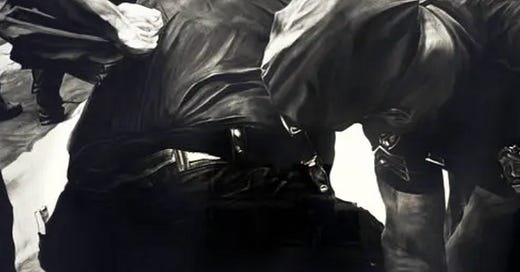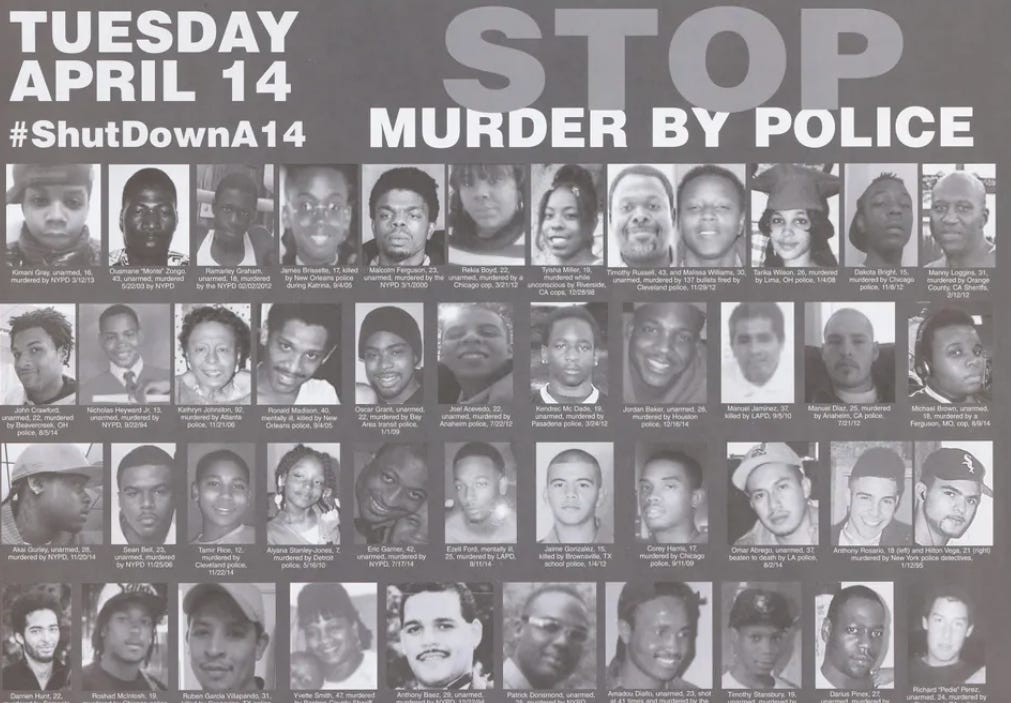We’ll Make a Villain of You Yet.
Chris Kaba: Selective Justice and The Falsehood of British Exceptionalism
I wish I could say I was surprised at the responses to the murder of yet another black man at the hands of yet another member of ‘public service’. It would be nice to imagine that we weren’t so eager to excuse murder as we’re arrogant enough to categorise others in one of two categories: those deserving of human life and those undeserving. And yet, I feel disgusted having to write this, because we’ve come to the conclusion that sometimes, it’s okay for policemen to murder you.
But what about...
"Not them! They were innocent. Chris Kaba held a gun. He was involved in ‘gang culture.’ He wasn’t a good person."
In some kind of elegance, I was going to make today’s introduction about how usually, notions of ‘objective morality’ tend to fall flat in the way that morality is entirely relative, but I’d rather not waste time writing an essay that reasons with the insufferably sanctimonious. Instead, I’ll get today’s conclusion out of the way now to avoid any anticipation regarding my view on the matter, even if you should know me by now.
I don’t care if Chris Kaba held a gun, I don’t even care if he at some point in his life used said gun. It actually doesn’t even matter if he killed somebody with that gun. The truth remains the same - The police are not judge, jury, or executioner and cannot just be allowed to shoot people. We’ve gotten far too familiar with the notion of violence inflicted by hands committed to ‘protecting and serving’, so much so that we’ve forgotten their role in society and we’ve seen what’s taken place in the meantime.
A Martyr
2 years ago, The Guardian reported on an inquest that was made into the death of Chris Kaba revealing that he was not a suspect and was being followed by an unmarked police car with no lights or sirens before he was fatally shot by a firearms officer known as NX121. At the time he embodied what we’ve come to know as the ‘perfect victim’, (as much as a black man could embody this archetype). By the public, he was considered harmless, as an unarmed father-to-be. More importantly, he was dead, and so people could feel good about defending his name, as they raised awareness about police brutality committed against **(the acceptable kind)** of black martyr after he was killed by a single shot to the head in Streatham on September 5.
The Independent Office for Police Conduct (IOPC) was at the time, investigating the incident, with lead investigator Dean Brown explaining that officers had been briefed on the car Kaba was driving, linking it to a prior firearms incident, though Kaba’s name was not mentioned. Then, his vehicle was followed until he turned onto a residential street, where armed officers confronted him, and NX121, standing in front of Kaba's car, fired a single shot through the windshield. Kaba was later pronounced dead at King’s College Hospital. Officer NX121 had been suspended and faced investigation for potential homicide. Kaba’s family, represented by his cousin Jefferson Bosela, expressed his frustration over the lengthy investigation and called for immediate action, urging the Crown Prosecution Service to decide on criminal charges and for more transparency from the IOPC. Bosela emphasized the family’s need for justice and accountability, expressing a collective demand for answers and accountability for the shooting of someone who was not only his family member, but someone whose death would serve as further evidence in a long line of cases that constitute unregulated violence.
Years later, it’s like we’re digging up his body to further investigate (justify) his murder.
(It seems even in death we can’t find rest).
An Outlaw
Last week, BBC News helped to platform the words of Former Met Police officer Tony Long, after he criticized the murder case against Officer Martyn Blake, calling it a “farce from start to finish.” Conducting a fair trial is made a little more difficult after one party is pronounced dead, so when Blake testified that he feared Kaba would harm officers as he tried to ram his way free, it’s essentially his word against… an empty space. Long, who himself was acquitted in 2015 for a similar case, voiced frustration with the trial, noting the bodycam footage quickly demonstrated the officers' sense of threat and that many, including jurors, questioned the need for a trial. Reflecting on his own experience, Long spoke about the long-lasting impact of being publicly named, commending recent reforms announced by Home Secretary Yvette Cooper to protect firearms officers’ identities unless convicted. Why we’re even entertaining the voice of a man with such undeniable bias here is mad to me, but I think we’re supposed to feel bad for the policemen who commit acts of murder because what if being labelled as a murderer might destroy their images, don’t you have a heart??!
In addressing racial concerns surrounding Kaba’s shooting, Long argued that both black and white communities understand the ‘complex issues around crime’, suggesting Black communities may feel particularly unsafe due to community-based gun and knife crime, a factor which always seems to force its way into discussions around police brutality, but remains just as irrelevant as always, unless we want to talk about what blame-shifting looks like.
A Villain
Worse still, Tory leadership candidate Robert Jenrick expressed that London is "safer" without Chris Kaba, a man with ‘known gang affiliations’, and advocated for raising the threshold for prosecuting firearms officers. His comments follow Home Secretary Cooper’s announcement, supporting her move whilst wanting more protections for officers who make ‘split-second decisions in challenging situations’. Following on, he criticized Mayor Sadiq Khan for sympathizing with Kaba, suggesting Khan should focus on supporting police officers like Blake. Jenrick also responded to Wretch 32, who had described Kaba’s murder as an assassination, defending Blake’s actions by labelling Kaba’s history of violent crime as endangering public safety,
“Nobody should mourn the death of this individual”.
Amidst all the talk about the threat to safety imposed by Chris Kaba, and by extension UK gang culture, it’s only fair that we consider the threat to safety imposed by the other side. As far as ‘split-second decisions’ go, we have to ask ourselves why Blake chose to shoot for Kaba’s head, instead of disarming the weapon at his disposal (his car) by shooting his tires. We know this institution is failing when the first port of call for officers in potentially dangerous situations is to murder almost instinctively, instead of displaying any effort to de-escalate the situation.
But tales of police brutality are hardly new within the diaspora. Police abolitionists in the US have been calling to defund the police from a position of retrospection. Now, as it appears we’re heading in the same direction, the black community in the UK have the opportunity to plant our feet on the only right side of this conversation before the racist fantasies of Jenrick and Long come to pass.
The acceleration of the debate surrounding police officers’ right to arms feels like a disruption of a centuries-long image curated by the British that says, ‘We’ll do this quietly and covertly’, in the way that Tory voters in this country might have only whispered notions of gun tolerance before, whereas now they’re shouting from the rooftops, a bid to “Give our police their power back!”
(or is that a different campaign)…
As black Brits, we’ve become far too invested in the belief of British exceptionalism, where we consider that we, passive tea-drinking liberals, far too civil to become victimised by the crimes we’re only used to seeing through phone screens. Either we’re in denial about where we’re headed, or we believe what, unfortunately, some of us do, that only the worst members of our community face imminent violence from our police force. We distinguish ourselves from Kaba, because unlike him we’d never find ourselves caught in that situation. Given the new laws surrounding police protection, too many are afraid to admit that Chris’ death represents a threat to our idealism about what we’re capable of as a nation. But down the line, the racial element of police despotism will become but a subset of a larger attack on the lower economic class, particularly as the wealth gap continues to increase, and become more distinctly divided into 2. When it becomes sometimes okay for policemen to shoot you with impunity, they’ll decide who the barrel might turn to next, whether you’re a black professional working in a high-rise or a white man living in poverty.
“Who deserves to get shot by police?”
-Is the most inefficient and irrelevant of questions here.
We can actually make this very simple and realise that we set an incredibly dangerous precedent when we allow policemen to decide who lives and who dies, regardless of the situation.
This should be common knowledge, and I don’t care about the ‘Well... Actually!’ of it all.
Asisa
https://www.theguardian.com/uk-news/2022/oct/04/chris-kaba-was-followed-by-police-before-being-fatally-shot-hears-inquest THE GUARDIAN, Chris Kaba was not a suspect before being fatally shot by police, hears inquest
https://www.bbc.co.uk/news/articles/cvgwx1970n7o BBC, Chris Kaba trial a farce - ex-Met firearms officer
https://news.sky.com/story/london-is-a-safer-place-without-chris-kaba-says-tory-leadership-hopeful-robert-jenrick-13240222 SKY NEWS, London 'is a safer place' without Chris Kaba, says Tory leadership hopeful Robert Jenrick






